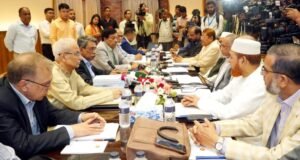 An Egyptian court triggered an international uproar Monday, confirming a death sentencefor 183 defendants.The defendants were convicted of murdering 11 police and two civilians in August 2013,Egypt’s state-run MENA news agency reported.Those deaths came in an attack on a police station.It followed a massive, deadly crackdown by Egyptian forces on supporters of ousted President Mohamed Morsy.”Today’s death sentences are yet another example of the bias of the Egyptian criminal justice system,” said Hassiba Hadj Sahraoui of Amnesty International. “These verdicts and sentences must be quashed and all of those convicted should be given a trial that meets international standards of fairness and excludes the death penalty.””Issuing mass death sentences whenever the case involves the killing of police officers now appears to be near-routine policy, regardless of facts and with no attempt to establishindividual responsibility,” Sahraoui added.”So far, 415 people have been sentenced to death in four trials for the killing of police officers, while the case against former President Hosni Mubarak, involving the killing of hundreds of protesters during the uprising, has been dropped. To date no security officers have been held to account for the killing of 1,000 protesters in August 2013,”the organization said on its website. Amnesty International opposes the death penalty altogether.Thirty-four of the 183 defendants were tried in absentia. All are permitted to appeal.’Massacre and mass killings of protesters’ In July and August 2013, hundreds of demonstrators — perhaps more than a thousand –were killed by Egyptian forces in what Human Rights Watch said “probably amounts to crimes against humanity.””The authorities have failed to hold even a single low-level police or army officer accountable for any of the killings, much less any official responsible for ordering them,and continue to brutally suppress dissent,” the group said. It issued a 188-page reporttitled “All According to Plan: The Rab’a Massacre and Mass Killings of Protesters inEgypt.”Since August 2013, 343 police personnel have been killed, Egypt’s Ministry of Interior says.The battle for EgyptAt the heart of all this is the battle for control of Egypt that has gripped the country for four years.In February 2011, strongman Mubarak was toppled. Morsy, a longtime fixture in the Muslim Brotherhood, became Egypt’s first democratically elected president in 2012. But he was deposed a year later in a military coup after mass protests.Also in 2013, Egyptian authorities cracked down on former Morsy supporters. In December of that year, Egypt’s interim government officially declared the Muslim Brotherhood a terrorist organization. (Hamas, the Palestinian militant group that controls Gaza, is a branch of the Muslim Brotherhood.)Egypt’s current government, led by President Abdel Fattah el-Sisi, has called for a “religious revolution” and asked Muslim leaders to help in the fight against extremism.He has launched a war against terrorism focused particularly on the country’s Sinai region where an extremist group recently pledged allegiance to ISIS.
An Egyptian court triggered an international uproar Monday, confirming a death sentencefor 183 defendants.The defendants were convicted of murdering 11 police and two civilians in August 2013,Egypt’s state-run MENA news agency reported.Those deaths came in an attack on a police station.It followed a massive, deadly crackdown by Egyptian forces on supporters of ousted President Mohamed Morsy.”Today’s death sentences are yet another example of the bias of the Egyptian criminal justice system,” said Hassiba Hadj Sahraoui of Amnesty International. “These verdicts and sentences must be quashed and all of those convicted should be given a trial that meets international standards of fairness and excludes the death penalty.””Issuing mass death sentences whenever the case involves the killing of police officers now appears to be near-routine policy, regardless of facts and with no attempt to establishindividual responsibility,” Sahraoui added.”So far, 415 people have been sentenced to death in four trials for the killing of police officers, while the case against former President Hosni Mubarak, involving the killing of hundreds of protesters during the uprising, has been dropped. To date no security officers have been held to account for the killing of 1,000 protesters in August 2013,”the organization said on its website. Amnesty International opposes the death penalty altogether.Thirty-four of the 183 defendants were tried in absentia. All are permitted to appeal.’Massacre and mass killings of protesters’ In July and August 2013, hundreds of demonstrators — perhaps more than a thousand –were killed by Egyptian forces in what Human Rights Watch said “probably amounts to crimes against humanity.””The authorities have failed to hold even a single low-level police or army officer accountable for any of the killings, much less any official responsible for ordering them,and continue to brutally suppress dissent,” the group said. It issued a 188-page reporttitled “All According to Plan: The Rab’a Massacre and Mass Killings of Protesters inEgypt.”Since August 2013, 343 police personnel have been killed, Egypt’s Ministry of Interior says.The battle for EgyptAt the heart of all this is the battle for control of Egypt that has gripped the country for four years.In February 2011, strongman Mubarak was toppled. Morsy, a longtime fixture in the Muslim Brotherhood, became Egypt’s first democratically elected president in 2012. But he was deposed a year later in a military coup after mass protests.Also in 2013, Egyptian authorities cracked down on former Morsy supporters. In December of that year, Egypt’s interim government officially declared the Muslim Brotherhood a terrorist organization. (Hamas, the Palestinian militant group that controls Gaza, is a branch of the Muslim Brotherhood.)Egypt’s current government, led by President Abdel Fattah el-Sisi, has called for a “religious revolution” and asked Muslim leaders to help in the fight against extremism.He has launched a war against terrorism focused particularly on the country’s Sinai region where an extremist group recently pledged allegiance to ISIS.
Don't Miss
 Weekly Bangla Mirror | Bangla Mirror, Bangladeshi news in UK, bangla mirror news
Weekly Bangla Mirror | Bangla Mirror, Bangladeshi news in UK, bangla mirror news






